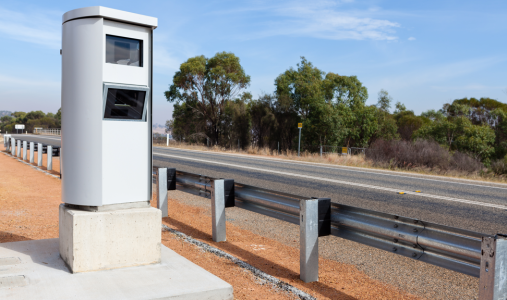Rebel gets hit with hefty fine for taking on speed cameras - find out what this Tassie vigilante did!
By
Gian T
- Replies 12
In the picturesque island state of Tasmania, where the roads wind through lush landscapes and coastal views, a local man decided to take a stand against what he saw as a punitive measure on the motoring public. However, his actions have led to a costly consequence, stirring up a debate on the balance between law enforcement and community sentiment.
Nicholas Groom, a 43-year-old from Launceston, has been fined for his attempt to shield fellow Tasmanians from the watchful eye of mobile speed cameras. His act of defiance? Physically tilting the lens of a portable speed camera away from the road was a move that temporarily prevented the device from catching any speedsters until authorities could correct its position.
This act of rebellion was not without its rationale, at least in Mr. Groom's eyes. He claimed to be 'doing the public [a] service and saving them from fines,' a sentiment that might resonate with anyone who's felt the sting of a speeding ticket. But while some may secretly applaud his audacity, the law takes a different view.
The Launceston Magistrates Court, where Mr Groom pleaded guilty to 'interfering with an offence detection device,' certainly didn't endorse his vigilante approach. Magistrate Ken Stanton handed down a $900 fine, a sum that ironically could have been captured by the very camera Mr. Groom sought to sabotage.
It's worth noting that this wasn't Mr. Groom's first brush with the law; his record includes six prior drunk driving offences, suggesting a troubled history with road safety regulations. This context adds a layer of complexity to the story, as it raises questions about the motivations behind his actions and the broader issues of road safety and enforcement.
The introduction of 'Tower' style speed cameras in Tasmania in 2022 marked a significant step up in the state's traffic enforcement capabilities. These cameras have been a financial boon for the local government, raking in over $10 million in fines revenue. And since August 2023, they've also been used to penalize drivers for mobile phone use and not wearing seatbelts, further extending their reach.
This incident opens up a conversation about the role of speed cameras and other traffic enforcement tools. Are they primarily a deterrent designed to keep our roads safe, or have they become a revenue-raising strategy for the government? And where should the line be drawn between ensuring compliance with traffic laws and respecting the rights of motorists?
For our readers at the Seniors Discount Club, many of whom have decades of driving experience, these questions are particularly pertinent. We understand the importance of road safety, especially as reaction times may slow with age. Yet, we also know the frustration of feeling targeted by what can seem like an overzealous system.
We invite you to share your thoughts and experiences with speed cameras and road enforcement. Have you found them to be a helpful reminder to stay within the speed limit, or do you feel they're more of a cash grab? And what do you make of Mr. Groom's actions – are they a misguided attempt at heroism, or do you sympathize with his perspective?
 Let's discuss the delicate balance between maintaining road safety and ensuring that enforcement measures are fair and reasonable. Your insights are valuable, and your stories could shed light on a topic that affects all of us who take to the road.
Let's discuss the delicate balance between maintaining road safety and ensuring that enforcement measures are fair and reasonable. Your insights are valuable, and your stories could shed light on a topic that affects all of us who take to the road.
Nicholas Groom, a 43-year-old from Launceston, has been fined for his attempt to shield fellow Tasmanians from the watchful eye of mobile speed cameras. His act of defiance? Physically tilting the lens of a portable speed camera away from the road was a move that temporarily prevented the device from catching any speedsters until authorities could correct its position.
This act of rebellion was not without its rationale, at least in Mr. Groom's eyes. He claimed to be 'doing the public [a] service and saving them from fines,' a sentiment that might resonate with anyone who's felt the sting of a speeding ticket. But while some may secretly applaud his audacity, the law takes a different view.
The Launceston Magistrates Court, where Mr Groom pleaded guilty to 'interfering with an offence detection device,' certainly didn't endorse his vigilante approach. Magistrate Ken Stanton handed down a $900 fine, a sum that ironically could have been captured by the very camera Mr. Groom sought to sabotage.
It's worth noting that this wasn't Mr. Groom's first brush with the law; his record includes six prior drunk driving offences, suggesting a troubled history with road safety regulations. This context adds a layer of complexity to the story, as it raises questions about the motivations behind his actions and the broader issues of road safety and enforcement.
The introduction of 'Tower' style speed cameras in Tasmania in 2022 marked a significant step up in the state's traffic enforcement capabilities. These cameras have been a financial boon for the local government, raking in over $10 million in fines revenue. And since August 2023, they've also been used to penalize drivers for mobile phone use and not wearing seatbelts, further extending their reach.
This incident opens up a conversation about the role of speed cameras and other traffic enforcement tools. Are they primarily a deterrent designed to keep our roads safe, or have they become a revenue-raising strategy for the government? And where should the line be drawn between ensuring compliance with traffic laws and respecting the rights of motorists?
For our readers at the Seniors Discount Club, many of whom have decades of driving experience, these questions are particularly pertinent. We understand the importance of road safety, especially as reaction times may slow with age. Yet, we also know the frustration of feeling targeted by what can seem like an overzealous system.
We invite you to share your thoughts and experiences with speed cameras and road enforcement. Have you found them to be a helpful reminder to stay within the speed limit, or do you feel they're more of a cash grab? And what do you make of Mr. Groom's actions – are they a misguided attempt at heroism, or do you sympathize with his perspective?
Key Takeaways
- A Tasmanian man has been fined for tampering with a mobile speed camera, claiming he was helping the public avoid fines.
- Nicholas Groom pleaded guilty to ‘interfering with an offence detection device’ and received a $900 fine.
- The incident was ironically captured by the very camera he was attempting to disable.
- This is not Mr Groom's first offence; he has a history of drunk driving, and the 'tower' style speed cameras in Tasmania have generated over $10 million since 2022.








